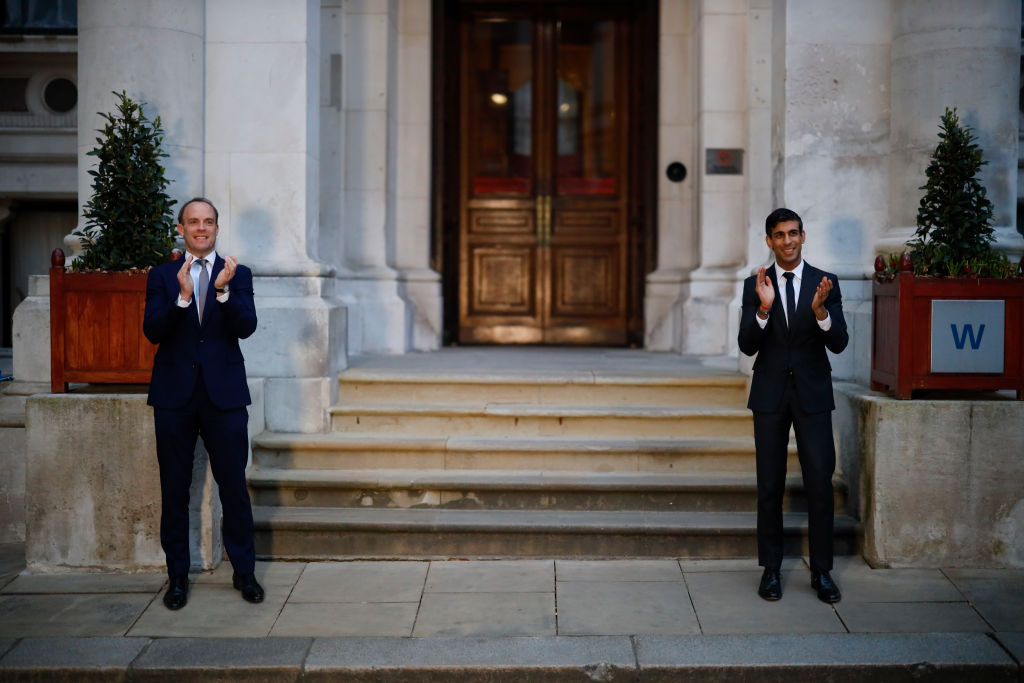Rishi Sunak seems keen to stand back from the row about Dominic Raab, offering more of a commentary on it being ‘right’ that the deputy prime minister and Justice Secretary has quit government, rather than accepting that Raab was a bully. His reply to Raab’s resignation letter suggests this, and this afternoon his official spokesman said the Prime Minister thought it was ‘right’ to make the commitment to resign if there was a finding of bullying and that the former Secretary of State had ‘kept his word’. ‘He thanks him for his work and it has allowed him to form a judgement and he will now be focused on the work of government,’ the spokesman said.
The timeline of what happened between Adam Tolley KC’s report arriving and Raab quitting is as follows: the Prime Minister received the report yesterday morning, then spoke to Tolley and his independent adviser to answer a number of questions about the report. He then spoke to Raab this morning, before Raab announced his resignation. Number 10 sources have emphasised to me that the Prime Minister did not ask Raab to quit.
The main takeaway from the report for Sunak seems to be about the processes around problems between ministers and civil servants, rather than anything about Raab himself. He has asked the Cabinet Office to look at how the government can better handle some of the issues the report has raised around concerns about working practices, and how they are dealt with, the spokesman said.
As for the report itself, it is not constantly excoriating about Raab. But it does say that he:
Acted in a way which was intimidating, in the sense of unreasonably and persistently aggressive conduct in the context of a work meeting. It also involved an abuse or misuse of power in a way that undermines or humiliates. He introduced an unwarranted punitive element. His conduct was experienced as undermining or humiliating by the affected individual, which was inevitable. It is to be inferred that the DPM was aware that this would be the effect of his conduct; at the very least, he should have been aware.
The second finding that goes against Raab is that he engaged in a ‘form of intimidating behaviour towards an individual by referring to the Civil Service Code in a way which could reasonably have been understood as suggesting that those involved had acted in breach’.
It does also undermine his previous claims that no issues had been raised with him about his behaviour. Tolley says:
Overall, I conclude that the DPM’s conduct during the MoJ period was on some occasions “abrasive”, in the sense of a personal style which is and feels intimidating or insulting to the individual but is not intended to be so. His conduct was not, however, “abusive”, in the sense of behaviour which is intended and specifically targeted. He has been able to regulate this level of “abrasiveness” since the announcement of the investigation. The DPM should have altered his approach earlier, and in particular after certain concerns had been flagged by Sir Philip Barton and Antonia Romeo.
Tolley examined the contradiction between Raab and Romeo’s accounts, and said that the permanent secretary at the Ministry of Justice had ‘produced notes of these conversations, which I was satisfied were derived from her contemporaneous records.’
Sunak will likely announce a new Justice Secretary later today, with the department widely considered a basket case in Whitehall – a sign that perhaps Raab’s management style wasn’t even particularly effective. The civil service world is trying to push back against claims that the allegations in the report just weren’t that serious – suggestions which are being made by a number of Tory MPs and Raab himself, who has warned it sets a ‘dangerous precedent’ for the way ministers and civil servants work together. Sunak, though, doesn’t seem to see the need to push back against the suggestion that all this has happened with him watching, rather than leading.







Comments